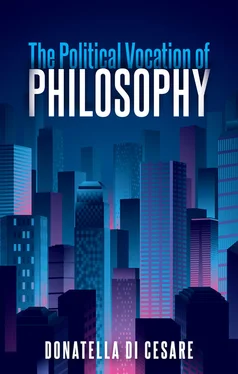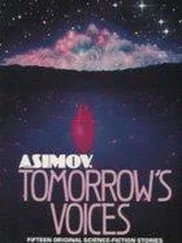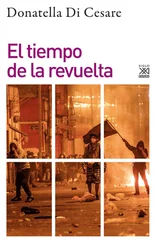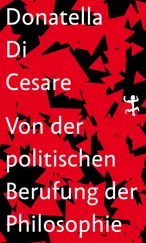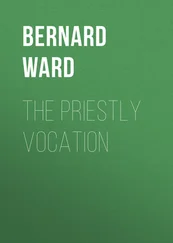For Heraclitus, this is even more true for wakefulness than it is for sleep. Whoever sleeps, though remaining the same person, seems to be another, ergátas , the ‘artifice’ of a world of his own (B 75). He resembles a dead man lying there, inert and distant. In one abstruse fragment, passed down by Clement of Alexandria, it is said, ‘Man kindles a light for himself in the night-time, when he has died but is alive. The sleeper, whose vision has been put out, lights up from the dead; he that is awake lights up from the sleeping’ (B 26). Whoever gives in to sleep abandons the koinón , the common world, to plunge into his own world, where he lies with the dead. Sleep is like a brief descent into Hades, in the gloomy underworld beneath the city. Thus, the citizen who sleeps is not only apathetic and alogical, but also apolitical and anomic. He ceases, rather, to be a citizen; he unites with its dead in the private burial recess which is, at the same time, the tomb of the public. He twists and turns in his illusions, in his nightmares, in his imagination, in his hallucinations. When it is night in the city and the world seems to sink away, perhaps no one is left to watch, alert, over the pólis . Yet there is one exception, or perhaps two. For there is both the wise god who keeps watch over the city walls, and his vicarious adept, the philosopher, who attentively surveils the city from within, so that this brightly lit opening does not forever close down in a private idiocy.
Is politics, then, the daughter of philosophy? The philosopher combats the night’s tendency to reduce everything to nothing. And even if one day everyone should give in, the city would remain, conserved in the thought of this extraordinary and attentive citizen.
The guardian of the city even before Plato and his politéia , Heraclitus denounces the political night. He points an accusing finger against the sleepwalking so widespread among his co-citizens, who do not want to wake up even during the day. He speaks of ‘night-walkers’, nuktipóloi , who hang out at – and with – night rather than lead the life required by the common day of the city. Heraclitus’ words are inspired by sarcasm, disappointment and disdain; his diurnal lógos inaugurates the space of the Greek pólis and, more generally, the ambit of European politics. The city can exist only thanks to the koinón , the common, gathered in the lógos . This is the ordering intelligence which guarantees the nómos on which the city bases itself. The diurnal lógos exposes the pólis ’s very existence; it heralds political ontology. ‘Those who speak with understanding must hold fast to what is common to all as a city holds fast to its law, and even more strongly’ (B 114).
In short: without the koinón of the lógos there is no pólis . Without the link provided by the lógos , which is common and makes common, the city could not come to pass. What maintains the unity of the citizens is the koinón , their participation in the day, beyond the isolation of the night. And this is why the return to the self comes through the re-entry into the political space. The original communism of vigilance – of which philosophy becomes the guardian – is the condition of political existence.
1 1. Diogenes Laërtius, The Lives and Opinions of Eminent Philosophers, London: G. Bell and Sons, 1915, p. 376.
2 2. G.W.F. Hegel, Lectures on the History of Philosophy, D, text from marxists.org.
3 3. See fragments B 1, B 26, B 73, B 75, B 87 and B 89. On this theme, see Martin Buber’s original essay ‘Dem Gemeinschaftlichen folgen’ (1956), in Logos. Zwei Reden, Heidelberg: Lambert Schneider, 1962, pp. 31–72; see also Peter Sloterdijk, Weltfremdheit, Frankfurt: Suhrkamp, 1993, pp. 344 et sqq.
3 The narcosis of light: on the night of capital
The metaphysics of light have followed a long journey in the West, leading from the common wakefulness to an exclusive and systematic knowledge. This is an unstoppable re-formation of the day, which expands and dilates to become much more than a simple interval between two nights. The dark areas are reduced, while the continuum of certainty illuminates all things in a whole of crystalline self-evidence. There is nothing, or almost nothing, that universal Reason does not unveil and bring out into the open. Thus, it decrees the triumph of the explicit over the concealed, of the present over the absent. What is no more, or not yet, degrades to a mere no-thing, by way of a stubborn ontology that chases away all otherness.
With a renewed Promethean endeavour, one can attempt to glimpse the perpetual light of the world beyond, in order to translate it – down here – into a constant enlightenment. This latter maintains the same uniform intensity without ever lighting up or going out. This is a decisive response – and it claims to be a definitive one – to the pavor nocturnus which has shaken the history of the world over the centuries. Better a narcosis of light, as a pre-emptive measure against the imminent apocalypse.
In the Book of Revelation, it is said: ‘And the city had no need of the sun, neither of the moon … the gates of it shall not be shut at all by day: for there shall be no night there’ (21, 23–5 KJV). The fight against concealed powers reached its peak in the modernity of the age of Lights. Then, it was put on pause when, rather than incriminate the night, the first Romantics lamented its loss. In his Hymns , Novalis proclaimed the night ‘holy, ineffable, mysterious’. 1The night is the robust ally of that interiority which otherwise threatens to vanish. But then this fight resumed its onward march, now with an accelerated rhythm, guided by science and underpinned by technology, which promised to do battle to the last against darkness. Metaphysical lights took concrete form and became electrical installations. The city, floodlit by the positive thought which guaranteed a pragmatic way of life, could forget the night. Or, better, mindful of what the Romantics had warned, it could recover the night, entrusting whatever was left of it to psychoanalysis’s field of competence. The overcoming of the night decreed and ratified the victory of the day which aspires to become permanent, expanding in a circadian continuum.
What would Heraclitus have said about this metaphysical illusionism, which transforms night into day, takes away opposites and erases the pulse and rhythm of the ancient cycle of sleep and wakefulness? Certainly, he would not have applauded all this. He dreaded the political night, with its capacity to disintegrate the communism of vigilance. But he would not have been inclined to approve that narcotic light which brings only sleepwalking and not high alert. For sure, he could not have imagined hundreds of millions of individuals sat up at night in front of bright screens, with such magnetic powers of attraction, which would forever compromise their imagination – meaning, that sublime human faculty of dreaming eyes-open, of losing oneself in one’s own thoughts.
They call it 24/7 – the concept of time bent to boundless production and consumption, imposed by the market system. It refers to the non-stop, ceaseless industriousness that stretches out over twenty-four hours a day, seven days a week. Only through a willing, mocking ambiguity does it refer to weeks at all. For on closer inspection, 24/7 repudiates any rhythm, erases any scansion of time. 2If the globe aims to be always-operational, why should human existence not itself adapt to this?
It would be mistaken to confuse 24/7 with modernity’s desolate rush into homogeneity, as critiqued by Lukács, Benjamin and others at the dawn of the twentieth century. For that time still had its rhythm set by the agenda of progress, linked to the illusion of growth. 24/7 is the time-without-becoming of post-history, the permanent day, capitalism’s final mirage. And fundamentally, such an outcome was part of its plans.
Читать дальше
